Ariens 915143-Zoom 50 Owner's manual
- Category
- Lawnmowers
- Type
- Owner's manual
This manual is also suitable for

Zoom ®
Owner/Operator Manual
Manuel Du Proprietaire/Utilisateur
Models
915131 - Zoom 34
915141 - Zoom 42
915143- Zoom 50
915151 - Zoom 34 Carb
915155 -Zoom 42 Carb
ENGLISH
,_ _ (_ FRANQAIS
04096200 5/10
Printed in USA

SAFETY .......................... 4
ASSEMBLY ....................... 9
CONTROLS AND FEATURES ....... 11
OPERATION ..................... 12
MAINTENANCE SCHEDULE ........ 16
SERVICE AND ADJUSTMENTS ..... 18
STORAGE ....................... 26
TROUBLESHOOTING ............. 27
SERVICE PARTS ................. 29
ACCESSORIES ................... 29
SPECIFICATIONS ................. 30
WARRANTY ..................... 32
NON-ENGLISH MANUALS
Manuals in languages other than
,t_ English may be obtained from your
Dealer. Visit your dealer or
www.ariens.com for a list of
-_ languages available for your
equipment.
Manuals printed in languages other
than English are also available as a
free download on our website:
htt p://www.ariens.co m
MANUALES EN IDIOMAS
DIFERENTES DEL INGLES
Puede obtener manuales en
idiomas diferentes del ingles en su
distribuidor. Visite a su distribuidor
o vaya a www.ariens.com para
obtener una lista de idiomas
disponibles para su equipo.
Tambien puede imprimir manuales
en idiomas diferentes del ingles
descargandolos gratuitamente de
nuestra pagina Web:
htt p://www.ariens.co m
MANUELS NON ANGLAIS
Des manuels dans differentes
,_ langues sont disponibles chez
votre revendeur. Rendez-vous
chez votre revendeur ou allez sur
-_ le site www.ariens.com pour
consulter la liste des langues
disponibles pour votre equipement.
Les manuels imprimes dans des
langues differentes de I'anglais
sont egalement disponibles en
telechargement gratuit sur notre
site Web:
htt p://www.ariens.co m
THE MANUAL
Before operation of unit, carefully and
completely read your manuals. The contents
will provide you with an understanding of
safety instructions and controls during normal
operation and maintenance.
All reference to left, right, front, or rear are
given from operator seated in operation
position and facing the direction of forward
travel.
MODEL AND SERIAL NUMBERS
When ordering replacement parts or making
service inquiries, know the Model and Serial
numbers of your unit and engine.
Numbers are located on the product
registration form in the unit literature
package. They are printed on a serial number
label, located on the frame of your unit under
the seat (figure 1).
Unit Serial Number Label
Figure 1
GB-2

RecordUnitModelandSerial DELIVERY
numbers here.
Record Engine Model and Serial
numbers here.
PRODUCT REGISTRATION
The Ariens dealer must register the product
at the time of purchase. Registering the
product will help the company process
warranty claims or contact you with the latest
service information. All claims meeting
requirements during the limited warranty
period will be honored, whether or not the
product registration card is returned. Keep a
proof of purchase if you do not register your
unit.
Customer Note: If the Dealer does not
register your product, please fill out, sign and
return the product registration card to Ariens
or go to www.ariens.com on the internet
UNAUTHORIZED REPLACEMENT
PARTS
Use only Ariens replacement parts. The
replacement of any part on this unit with
anything other than an Ariens authorized
replacement part may adversely affect the
performance, durability, and safety of this unit
and may void the warranty. Ariens disclaims
liability for any claims or damages, whether
warranty, property damage, personal injury or
death arising out of the use of unauthorized
replacement parts.
NOTE: A complete Parts manual may be
download from www.ariens.com on the
internet.
Customer Note: If you have purchased this
product without complete assembly and
instruction by your retailer, it is your
responsibility to:
Read and understand all assembly
instructions in this manual. If you do
not understand or have difficulty
following the instructions, contact your
nearest Ariens Dealer for assistance.
NOTE: To locate your nearest Ariens Dealer,
go to www.ariens.com on the internet.
WARNING: Improper assembly
or adjustments can cause serious
injury.
BeforeAttempting to Operate Your
Unit:
1. Make sure all assembly has been
properly completed.
2. Understand all Safety Precautions
provided in the manuals.
3. Review control functions and operation
of the unit. Do not operate the unit
unless all controls function as described
in this manual.
4. Review recommended lubrication,
maintenance and adjustments.
5. Review Limited Warranty Policy.
6. Fill out a product registration card and
return the card to the Ariens Company or
go to www.ariens.com.
DISCLAIMER
Ariens reserves the right to discontinue,
change, and improve its products at any time
without notice or obligation to the purchaser.
The descriptions and specifications contained
in this manual were in effect at printing.
Equipment described within this manual may
be optional. Some illustrations may not be
applicable to your unit.
GB-3

[,.'_-,1_1=11"4
WARNING: This cutting machine
is capable of amputating hands
and feet and throwing objects.
Failure to observe the safety
instructions in the manuals and on
decals could result in serious
injury or death.
Slopes are a major factor related
to loss-of-control and tip-over
accidents. Operation on all slopes
requires extra caution.
Tragic accidents can occur if the
operator is not alert to the
presence of children. Never
assume that children will remain
where you last saw them.
Gasoline is extremely flammable
and the vapors are explosive,
handle with care.
Disengage attachment, stop unit
and engine, remove key, engage
parking brake, and allow moving
parts to stop before leaving
operator's position.
SAFETY ALERTS
A Look for these symbols to point
out important safety
precautions. They mean:
Attention!
Personal Safety Is
Involved!
Become Alert!
Obey The Message!
The safety alert symbol is used in decals and
with this manual. Understand the safety
message. It contains important information
about personal safety.
A WARNING: POTENTIALLY
HAZARDOUS SITUATION! If not
avoided, COULD RESULT in
death or serious injury.
A DANGER: IMMINENTLY
HAZARDOUS SITUATION! If not
avoided, WILL RESULT in death
or serious injury.
CAUTION: POTENTIALLY
HAZARDOUS SITUATION! If not
avoided, MAY RESULT in minor
or moderate injury. It may also be
used to alert against unsafe
practices.
NOTATIONS
NOTE: General reference information for
proper operation and maintenance practices.
IMPORTANT: Specific procedures or
information required to prevent damage to
unit or attachment.
SAFETY DECALS AND
LOCATIONS
ALWAYS replace missing or damaged Safety
Decals. Refer to figure 2 for Safety Decal
locations.
GB-4

Figure2
1.DANGER! &DANGER!
Avoid injury - Stay clear of
rotating parts.
OL1816
2.CAUTION
No smoking.
IMPORTANT: DO NOT overfill.
i_ Fill fuel tank to below bottom of
filler neck (see FILLING FUEL
TANK on page 13).
,_ WARNING: Over Filling may cause
severe damage to evaporative
system !
Never fill fuel tank when engine is
running, hot or unit is indoors. Never
overfill fuel tank.
Replace fuel cap securely and clean
up spilled fuel.
#
OL1809
Always keep feet and hands
away from rotating parts.
Always stand clear of discharge
area. Do not direct discharge
toward other people.
D:Ltt Keep people away from unit
while operating.
OL1812
Shut off engine, remove key,
and read manual before you
adjust or repair unit.
NO STEP! Always keep feet
away from rotating parts.
OL1813
GB-5

4.DANGER! TO AVOID SERIOUS
INJURY OR DEATH
&WARNING!
OLt801
DJ
OL1802
Read the operator's manual.
Keep children and others away
from unit while operating.
OL1814
OLI8t5
Always stand clear of discharge
area.
Do not operate mower unless
bagger is attached or guards
are in operating position.
Never direct discharge toward
J__L"_ other people. Thrown objects
-,--;_r.._ can cause injury.
--%L_3
Look down and behind before
and while backing.
OL1804
OL1806
Never carry children.
OL1807
Go up and down slopes, not
across.
DO NOT operate on slopes
over 10°.
If machine stops going uphill, stop
blade and back down slowly.
Avoid sudden turns.
Keep safety devices (guards,
shields, switches, etc.) in place and
working.
Check interlock system per manual
before use.
Understand location and function of
all controls.
Never allow operation by untrained
persons.
Disengage PTO, stop unit and
engine, set parking brake and
remove key before making any
inspections, repairs, etc.
&DANGER!
Keep hands and feet away.
_ii_._,_ Do not operate mower unless
guards are in operating position
_--_--_,,_ or bagger is attached.
7.HOT SURFACES!
OL180I
DO NOT touch parts which are
hot from operation. ALWAYS
allow parts to cool.
EMISSION CONTROL SYSTEM
This equipment and/or its engine may include
exhaust and evaporative emissions control
system componeents required to meet U.S.
Environmental Protection Agency (EPA)
and!or California Air Resources Board
(CARB) regulations. Tampering with emission
controls and components by unauthorized
personnel may result in severe fines or
penalties. Emission controls and components
can only be adjusted by an Ariens Company
Dealer or an authorized engine
manufacturing service center. Contact your
Ariens Company Equipment Retailer
concerning emission controls and component
questions.
SAFETY RULES
If unit is to be used by someone other than
original purchaser; loaned, rented or sold,
ALWAYS provide this manual and any
needed safety training before operation.
Only the user can prevent and is responsible
for accidents or injuries occurring to
themselves, other people or property.
GB-6

Read,understand,andfollowallsafety
practicesinOwner/OperatorManualbefore
assembling,usingorworkingonthismower.
ALWAYSremovekeyfromignitionandwire
fromsparkplugbeforeassembly,orworking
onthisunit.
Inspectunitbeforeeachusefor:missingor
damageddecalsandshields,correctly
operatingsafetyinterlocksystem,and
deteriorationofgrasscatchers.Replaceor
repairasneeded.
ALWAYScheckoverheadandside
clearancescarefullybeforeoperation.
ALWAYSbeawareoftrafficwhencrossingor
operatingalongstreetsorcurbs.
Keepchildren,people,andpetsaway.Be
alertandshutoffunitifanyoneenterswork
area.Keepchildrenunderwatchfulcareofa
responsibleadult.
NEVERallowchildrentooperateorplayon
ornearunit.
Keepareaofoperationclearofalltoys,and
debris.Thrownobjectscancauseinjury.
Stayalertforhiddenhazards,holes,andruts.
Avoidunevenorroughterrain.DONOT
operateneardrop-offs,ditches,or
embankments.Unitcansuddenlyturnoverif
awheelisovertheedgeofaclifforditch,orif
anedgecavesin.
Dust,fog,etc.canreducevisionandcause
anaccident.Operateunitonlywhenthereis
goodvisibilityandlight.
Dataindicatesthatoperators,age60and
above,areinvolvedinalargerpercentageof
ridingmowerrelatedinjuries.These
operatorsshouldevaluatetheirabilityto
operatetheridingmowersafelyenoughto
protectthemselvesandothersfromserious
injury.
Onlytrainedadultsmayoperateunit.Training
includesbeingfamiliarwithcontrolsand
actualoperation.
NEVERoperateunitafterorduringtheuseof
medication,drugsoralcohol.
NEVERallowanyonetooperatethisunit
whentheiralertnessorcoordinationis
impaired.
Wearadequatesafetygear,sturdyshoes,
andprotectivegloves.
DONOTwearlooseclothingorjewelryand
tiebackhairthatmaygetcaughtinrotating
parts.
Protecteyes,faceandheadfromobjectsthat
maybethrownfromunit.Wearappropriate
hearingprotection.Alwayswearsafety
gogglesorsafetyglasseswithsideshields
whenoperatingmower.
Avoidsharpedges.Sharpedgescancut.
Movingpartscancutofffingersorahand.
ALWAYSkeephandsandfeetawayfromall
rotatingpartsduringoperation.Rotatingparts
cancutoffbodyparts.
ALWAYSkeephandsawayfromallpinch
points.
Startandoperateunitonlywhenseatedin
operator'sposition.Steeringcontrollevers
mustbeinneutral,PTOdisengagedand
parkingbrakesetwhenstartingengine.
ALWAYSkeepbodyandhandsawayfrom
pinholesornozzleswhichejecthydraulic
fluidunderpressure.
DONOTtouchunitpartswhichmightbehot
fromoperation.Allowpartstocoolbefore
attemptingtomaintain,adjustorservice.
NEVERplaceyourhandsoranypartofyour
bodyorclothinginsideornearanymoving
partwhileunitisrunning.
NEVERdirectdischargetowardspersonsor
property.Thrownobjectsmayricochetback
towardsoperator.ALWAYSstandclearofthe
dischargearea.
ALWAYSdisengageattachment,stopunit
andengine,removekey,engageparking
brake,andallowmovingpartstostopbefore
leavingoperator'sposition.
Useextremecautionongravelsurfaces.
DisengagePTOwhenattachmentisnotin
useandwhencrossinggravelsurfaces.
DONOToperateunitifsafetyinterlock
systemisdamagedordisabled.Checksafety
interlockbeforeeachuse.
ALWAYSremovekeytopreventunauthorized
use.
DO NOT operate at too fast a rate. Slow
down before turning.
Stop engine before removing grass catcher or
unclogging chute.
DO NOT mow on wet grass. Reduced
traction could cause sliding.
DO NOT try to stabilize the machine by
putting your foot on the ground.
Know the weight of loads. Limit loads to those
you can safely control and the unit can safely
handle.
ALWAYS keep protective structures, guards
and panels in good repair, in place and
securely fastened.
GB-7

Donotoperatewithouteitherentiregrass
catcherorthedischargeguardinplace.
DONOToperateinreverseunlessabsolutely
necessary.ALWAYSlookdownandbehind
beforeandwhilebacking;especiallyfor
children.
Followthemanufacturer'srecommendations
forwheelweightsorcounterweightsto
improvestabilitywhenusingattachments.
NEVERcarrypassengers-especially
children-evenwithbladesoff.
Useextracarewhenapproachingblind
cornersorobjectsthatmayobscurevisionof
hiddenobstaclesandchildren.
Ifyoucannotbackupaslopeoryoufeel
uneasyonit,donotmowit.
Mowupanddownslopes,notacrossthem.
Useslowspeedonanyslope.Tiresmaylose
tractiononslopeseventhoughthebrakesare
functioningproperly.
Keepallmovementsontheslopeslow and
gradual, DO NOT make sudden changes in
speed or direction.
Use extra care while operating machines with
grass catcher or other attachments. They can
affect stability of the machine.
Avoid starting, stopping, or turning on a
slope. If tires lose traction, disengage the
blades and proceed slowly straight down the
slope.
DO NOT operate on slopes over 10°.
DO NOT park on slopes unless necessary. If
unit is parked on a slope, ALWAYS chock or
block wheels and set parking brake.
DO NOT disengage or bypass transmission
and coast downhill.
Tow only with a machine that has a hitch
designed for towing. Do not attach towed
equipment except at the hitch point.
Follow the manufacturer's recommendations
for weight limits for towed equipment and
towing on slopes.
Maximum Tongue weight: 30 Ibs.
Maximum Trailer weight: 300 Ibs.
Do not use hitch with bagger attached.
Do not use on steep hills or slopes.
Do not park on hills when trailer is attached.
Do not use with any ground engaging
equipment.
NEVER allow children or others in or on
towed equipment.
On slopes, the weight of the towed equipment
may cause loss of traction and loss of control.
Travel slowly and allow extra distance to stop.
Use extra care when loading or unloading
unit onto trailer or truck.
Secure unit chassis to transport vehicle.
NEVER secure from rods or linkages that
could be damaged.
DO NOT transport machine while engine is
running.
ALWAYS turn off power to attachment and
shut off fuel when transporting unit.
Keep unit free of grass clippings, leaves, and
other debris. Clean up oil or fuel spills.
This product is equipped with an internal
combustion type engine. DO NOT use unit on
or near any unimproved, forest-covered or
brush covered land unless exhaust system is
equipped with a spark arrester meeting
applicable local, state or federal laws. A spark
arrester, if it is used, must be maintained in
effective working order by operator.
Fuel is highly flammable and its vapors are
explosive. Handle with care. Use an
approved gasoline container with an
appropriate sized dispensing spout.
NO smoking, NO sparks, NO flames.
ALWAYS allow engine to cool before
servicing.
NEVER fill fuel tank when engine is running
or hot from operation.
NEVER fill or drain fuel tank indoors.
NEVER overfill fuel tank.
Replace fuel cap securely and clean up
spilled fuel.
NEVER fill containers inside a vehicle or on a
truck or trailer bed with a plastic liner. Always
place containers on the ground away from
your vehicle before filling.
When practical, remove gas-powered
equipment from the truck or trailer and refuel
it on the ground. If this is not possible, then
refuel such equipment on a trailer with a
portable container, rather than from a
gasoline dispenser nozzle.
Keep the nozzle in contact with the rim of the
fuel tank or container opening at all times until
fueling is complete. Do not use a nozzle lock-
open device.
If fuel is spilled on clothing, change clothing
immediately.
Avoid Electric Shock. Objects contacting both
battery terminals at the same time may result
in injury and unit damage. DO NOT reverse
battery connections.
GB-8

ExplosiveGasesfrombatterycancause
deathorseriousinjury.Poisonousbattery
fluidcontainssulfuricacidanditscontactwith
skin,eyesorclothingcancausesevere
chemicalburns.
NOflames,NOsparks,NOsmokingnear
battery.
ALWAYSwearsafetyglassesandprotective
gearnearbattery.Useinsulatedtools.
DONOTTIPbatterybeyonda45°anglein
anydirection.
ALWAYSkeepbatteriesoutofreachof
children.
Batteryposts,terminalsandrelated
accessoriescontainleadandlead
compounds,chemicalsknowntotheStateof
Californiatocausecancerandreproductive
harm.Washhandsafterhandling.
Reverseconnectionsmayresultinsparks
whichcancauseseriousinjury.Always
connectpositive(+)leadofchargerto
positive(+)terminal,andnegative(-)leadto
negative(-)terminal.
ALWAYSdisconnectnegative(-)cableFIRST
andpositive(+)cableSECOND.ALWAYS
connectpositive(+)cableFIRST,and
negative(-)cableSECOND.
Afrozenbatterycanexplodeandresultin
deathorseriousinjury.DONOTchargeor
jumpstartabatterycontainingfrozenfluid.
Thawthebatterybeforeputtingonacharger
orjumpstarting.
ALWAYSkeepprotectivestructures,guards,
andpanelsingoodrepair,inplaceand
securelyfastened.NEVERmodifyorremove
safetydevices.
DONOTchangeenginegovernorsettingsor
over-speedengine.
Fumesfromengineexhaustcancauseinjury
ordeath.DONOTrunengineinanenclosed
area.Alwaysprovidegoodventilation.
ALWAYSmaintainunitinsafeoperating
condition.Damagedorwornoutmufflercan
causefireorexplosion.
Stopandinspectequipmentifyoustrikean
objectorifthereisanunusualvibration.
Repair,ifnecessary,beforerestarting.Never
makeadjustmentsorrepairswiththeengine
running.
Mowerbladesaresharpandcancutyou.
Wraptheblade(s)orweargloves,anduse
extracautionwhenservicingthem.NEVER
weldorstraightenmowerblades.
Rotationofoneblademaycauserotationof
theotherblades.
Checkbrakeoperationfrequently.Adjustand
serviceasrequired.
Keepallhardwareproperlytightened.
Storedenergyinspringscancauseinjury.
Maintainorreplacesafetyandinstruction
labels,asnecessary.
Neverstorethemachineorfuelcontainer
insideabuildingwherethereisanopen
flame,suchasawaterheater.
Shutofffuel(ifprovided)andallowengineto
coolcompletelybeforestoringinclosedarea
orcoveringunit.
Cleangrassanddebrisfromunit,especially
fromaroundmufflerandengine,tohelp
preventfires.
Forextendedstorage,cleanunitthoroughly.
SeeEngineManualforproperstorage.
Useonlyattachmentsoraccessories
designedforyourunit.
Checkattachmentcomponentsfrequently.If
wornordamaged,replacewith
manufacturer'srecommendedparts.
_[.,."_"]::1_v_I:)_"d
WARNING: AVOID INJURY.
Read and understand the entire
Safety section before proceeding.
Tools Required
Adjustable wrench
Petroleum jelly or dielectric grease.
Unpack Unit
Remove unit and all other components from
the shipping container. Engage transmission
bypass lever (see MOVING UNIT
MANUALLYon page 15). Push unit from
container onto a level surface. Disengage
transmission bypass lever.
Connect Battery
See Battery Removal and Installation on
page 22 and perform steps 2 and 3 in the
installation section.
GB-9

Place Unit in Operating Position
(Figure3):
NOTE: The seat is shipped with the seat
positioned as far back as possible.
1. Tip seat forward and adjust the seat as
needed (see TIPPING SEAT
FORWARD on page 18 and SEAT
ADJUSTMENT on page 18).
2. Remove eccentric spacers and rotate
steering levers to the operating position.
Reinstall spacers. Do not tighten.
3. Adjust steering levers (see ADJUSTING
STEERING LEVERS on page 24).
1. Steering Lever 3. Eccentric
2. Seat Spacer
Figure 3
Check Engine Oil Level
Referto Engine Manual.
Check Tire Pressure
A AUTION: Avoid injury!
Explosive separation of tire and
rim parts is possible when they
are serviced incorrectly:
Do not attempt to mount a
tire without the proper
equipment and experience
to perform the job.
Do not inflate the tires
above the recommended
pressure.
Do not weld or heat a
wheel and tire assembly.
Heat can cause an
increase in air pressure
resulting in an explosion.
Welding can structurally
weaken or deform the
wheel.
Do not stand in front or
over the tire assembly
when inflating. Use a clip-
on chuck and extension
hose long enough to allow
you to stand to one side.
See SPECIFICATIONS on page 30.
Level Mower Deck
See LEVELLING AND ADJUSTING PITCH
OF MOWER DECK on page 20.
Fill Fuel Tank
See FILLING FUEL TANK on page 13.
Check Safety Interlock System
A ARNING: Safety interlockfailure and improper operation of
unit can result in death or serious
injury. Check system before each
use to make sure it is functioning
properly.
See Safety Interlock System on page 12.
Check function of all controls
See OPERATION on page 12.
GB - 10

[_o]_jij_[o]l_,.']r-'__,In_]I_1_-'_nt_"]
6
4
915131, 915141
11
10
915143
9
13
12
7
5
8
Figure 4
1. Throttle/Choke Lever ( 915131, 141)
2. Ignition Switch
3. PTO Switch
4. Seat
5. Fuel Level
6. Steering Levers
7. Fuel Tank
8. Mower Lift Pedal
9. Mower Deck
10. Discharge Chute
11. Parking Brake'
12. Choke (915143)
13. Throttle (915143)
GB- 11

,_ WARNING: AVOID INJURY.
Read and understand the entire
Safety section before proceeding.
CONTROLS AND FEATURES
See figure 4 for all controls and features
locations.
Safety Interlock System
WARNING: Safety interlock failure
and improper operation of unit can
result in death or serious injury.
Check system before each use to
make sure it is functioning
properly.
Test Steering Lever PTO
1 Neutral Position Off
2 Neutral Position On
3 Neutral Position Off
4*+ Out of Neutral Position Off
5*+ Neutral Position On
Test with engine running.
+ Operator lifts off seat.
Ignition Switch
1
Perform the following tests to ensure the
safety interlock system is working properly. If
the unit does not perform as stated contact
your Ariens dealer for repairs.
m .
Jlt
m _ +J
_ +<s.+.,--i
-41,-3
OE0002
Operate ignition switch
with a removable key.
Ignition switch has three
positions: Stop (1),
Run (2), Start (3). See
STARTING AND
SHUTTING OFF
ENGINE on page 14 for
detailed instructions on
how to start engine.
Throttle/Choke Lever (915131, 141 )
Choke (1) - Use to start a cold
i\!1 en0ine.
Fast (2) - Increases engine
speed.
Slow (3) - Decreases engine
speed.
Parking Brake
Engaged
Engaged
Disengaged
Disengaged
Engaged
Throttle (915143)
Engine
Starts
Doesn't Start
Doesn't Start
Shuts Off
Shuts Off
Fast (1) - Increases engine
speed.
O
OE0002
Choke (91
Parking Brake
Slow (2) - Decreases engine
speed.
5143)
Pull choke control out to start a
cold engine.
Push choke control in when
engine is warm.
Engages (2) and
disengages (1) parking
brake.
GB - 12

Power Take-Off (PTO) Switch
o 1
Engages (2) and disengages (1) mower
blades.
Steering Levers
Reverse (1)- Pull both steering levers
backward.
Forward (2) - Push both steering
levers forward.
Left (3) - Pull left steering lever back
or push right steering lever forward or
a combination of both.
Right (4) - Pull right steering lever
back or push left steering lever
forward or a combination of both.
NOTE: To stop, return both steering levers to
neutral.
NOTE: The steering levers must be in the
neutral position to start the engine.
NOTE: The parking brake must be
disengaged prior to moving the steering
levers from the neutral position.
Mower Lift Pedal (Figure 5)
Raises and lowers mower deck.
Press mower lift pedal and install adjustment
pin in the desired adjustment hole.
3 2
2. Adjustment
1. Mower Lift
Pedal Hole
3. Adjustment Pin
Figure 5
NOTE: The adjustment pin is used to set the
height of the mower deck. See
SPECIFICATIONS on page 30 for cutting
height dimensions.
Fuel Level
Slot in seat plate shows the fuel level in the
tank. Refill when level gets to bottom of slot.
FILLING FUEL TANK
1. Clean fuel cap and surrounding area to
prevent dust, dirt, and debris from
entering fuel tanks.
2. Remove fuel cap.
IMPORTANT: See Engine Manual for correct
type and grade of fuel.
3. Tilt seat fully forward to make fuel tank
fully visible.
IMPORTANT: This equipment
and/or its engine may include
emissions control system
components, required to meet EPA
and/or CARB regulations, that will
only function properly when the fuel
tank has been filled to the
recommended level. Overfilling may
cause permanent damage to
emissions control system
components. Filling to
recommended level ensures a vapor
gap required to allow for fuel
expansion. Pay close attention while
filling the fuel tank to ensure that the
recommended fuel level inside the
tank is not exceeded. Use a gasoline
container with an appropriately sized
dispensing spout when filling the
tank. Do not use a funnel or other
device that obstructs the view of the
tank filling process.
4. Fill fuel tank to below bottom of filler
neck. See SPECIFICATIONS on
page 30 for capacity of fuel tanks.
5. Replace fuel cap.
GB - 13

GASOLINE
IMPORTANT: ALWAYS use gasoline that
meets the following guidelines:
Clean, fresh gasoline.
A minimum of 87 octane/87 AKI
(91 RON). High altitude use may
require a different octane. Consult
your engine manual.
Gasoline with up to 10% ethanol
(gasohol) or up to 10% MTBE (methyl
tertiary butyl ether) is acceptable.
Use of any gasoline other than those
approved above will void the engine
warranty. If the pumps are not marked
for the content of alcohol or ethers,
check ethanol and MTBE levels with
the fuel supplier.
Do not modify the fuel system to use
different fuels.
Never mix oil and gasoline.
NOTE: All gasoline is not the same. If the
engine experiences starting or performance
problems after using a new gasoline, switch
to a different fuel provider or fuel brand.
IMPORTANT: Excessively oxygenated or
reformulated fuels (fuels blended with
alcohols or ethers) can damage the fuel
system or cause performance problems. If
any undesirable operating problems occur,
use a gasoline with a lower percentage of
alcohol or ether.
Fuel Stabilizer
Gasoline left in the fuel system for extended
periods without a stabilizer will deteriorate,
resulting in gum deposits in the system.
These deposits can damage the carburetor
and the fuel hoses, filter and tank. Prevent
deposits from forming in the fuel system
during storage by adding a quality fuel
stabilizer to the fuel. Follow the
recommended mix ratio found on the fuel
stabilizer container.
STOPPING IN AN EMERGENCY
Bring steering levers back to neutral, set
parking brake, and turn off engine.
STARTING AND SHUTTING OFF
ENGINE
Starting the Engine
NOTE: Disengage the PTO, place the
steering levers in neutral, and engage the
parking brake prior to starting the engine.
1. If the engine is cold, move the choke
control to the On position. If the engine
is warm or hot, do not use choke.
IMPORTANT: DO NOT operate starter for
more than 10 seconds per minute as damage
can occur.
2. Put the ignition key in the switch and
turn it to the Start position.
3. As soon as the engine starts, release the
key.
4. Move the choke control to the Off
position from the Choke position. Wait
until the engine is running smoothly
before operation.
IMPORTANT: Let the engine warm up
several seconds to several minutes
depending on outside temperature.
Stopping the Engine
1. Stop unit.
2. Disengage PTO.
3. Set throttle lever to slow.
4. Turn ignition switch to off position and
remove key.
5. Set parking brake.
OPERATING MOWER
1. Start engine.
2. Set throttle lever to fast.
IMPORTANT: Never engage PTO if mower is
plugged with grass or other material.
3. Engage PTO to start mower blades. It
will take 2-3 seconds for the blades to
engage.
NOTE: The parking brake must be
disengaged prior to moving the steering
levers from the neutral lockout position.
4. Release parking brake.
5. Use steering levers to move the unit.
6. Disengage PTO to stop mower blades.
GB - 14

TRANSPORTING UNIT
ALWAYS shut off engine, set parking brake,
remove key, and drain fuel when transporting
unit on a truck or trailer. Tie unit down
securely. Do not tie down by linkages,
guards, cables or other parts that may be
damaged.
FOR BEST PERFORMANCE
Cut grass when it is dry.
Keep mower blades sharp.
Keep mower deck properly leveled.
Do not set height of cut too low. For very tall
grass, mow twice.
Do not travel too fast.
Mow with the engine set at full throttle.
When mulching, only remove 1/3 of grass
length per cutting.
Discharge clippings into areas already cut.
Vary cutting pattern with each mowing.
Do not allow grass or debris to collect inside
of mower deck. Clean after each use.
MOVING UNIT MANUALLY
,_ WARNING: DO NOT disengageor bypass transmission and coast
downhill.
Pull the bypass lever out and lock it in place,
and then release the parking brake to push
the unit by hand.
Push the lever in to drive the unit normally.
NOTE: There are two bypass levers; one on
each side of the unit.
1
1. Bypass lever pulled out to push
the unit by hand.
2. Bypass lever pushed in to drive
the unit.
Figure 6
GB- 15

WARNING:AVOIDINJURY.ReadandunderstandtheentireSafety
section before proceeding.
IMPORTANT: Proper maintenance can
prolong the life of unit. The following chart
shows the recommended service schedule.
Refer to the maintenance instructions in the
Engine Manual for additional information.
NOTE: To have full access to the engine, the
seat must be tipped forward (see TIPPING
SEAT FORWARD on page 18) and the hood
opened (see MOWER DECK REMOVAL
AND INSTALLATION on page 18).
nterval .Taski.Action
Each Use Check
Safety
Interlock
System
Check
Parking
Brake
Clean Unit
WARNING: Safety interlock system failure and improper
operation of unit can result in death or serious injury. Test
this system each time the unit is operated. If this system
does not function as described, do not operate until repairs
are made (see Safety Interlock System on page 12).
Engage parking brake and engage transmission bypass lever (see
MOVING UNITMANUALLYon page 15). Push unit. If unit rolls, contact
your Ariens Dealer.
Clean engine, battery, seat, mower deck, etc. of all dirt and debris. Do
not use solvents, hard cleaners, or abrasives.
NOTE: Protect painted surfaces with automotive type wax.
IMPORTANT: Do not spray the unit with water, especially when the unit
is warm from operation. Water can seep into bearings and damage
them.
Check
Tires
Check
Mower
Blades
See SPECIFICATIONS on page 30 for correct tire pressure.
,_ CAUTION: Avoid injury! Explosive separation of tire and rim
parts is possible when they are serviced incorrectly:
•Do not attempt to mount a tire without the proper equipment
and experience to perform the job.
Do not inflate the tires above the recommended pressure.
Do not weld or heat a wheel and tire assembly. Heat can cause
an increase in air pressure resulting in an explosion. Welding
can structurally weaken or deform the wheel.
Do not stand in front or over the tire assembly when inflating.
Use a clip-on chuck and extension hose long enough to allow
you to stand to one side.
Check for worn or damaged mower blades (see SHARPENING
MOWER BLADE on page 22).
GB - 16

nterval .Taski.Action
Each Use Follow
Engine
Manual
Mainten-
ance
Schedule
25 Hours Check
3r Every Battery
Season
Lubricate
Unit
Keep battery and battery terminals clean (see Cleaning Battery and
Battery Cables on page 23).
Apply grease to zerk (1) on each
front wheel
50 Hours
or Every
Season
00 Hours
or Every
Season
Check Check mower blade mounting hardware and all other fasteners.
Fasteners Replace fasteners that are missing or damaged. Tighten all nuts and
bolts to the correct torque value.
Check All
Belts
Replace worn or deteriorated belts.
Check hydrostatic belt (see REPLACING HYDROSTATIC BELT
on page 26 for hydrostatic belt location).
Check PTO belt (see REPLACING PTO BELTon page 25 for
PTO belt location).
Check All Replace worn or improperly functioning PTO cables.
Cables
GB - 17

_.'_i[o]_r:1_Il_Wll_ll_l|_v_I=I_i__]
WARNING: AVOID INJURY.
Read and understand the entire
Safety section before proceeding.
TIPPING SEAT FORWARD
Put steering levers up and tip seat forward
(figure 7).
1. Seat Tipped Forward
2. Mounting Hardware
Figure 7
SEAT ADJUSTMENT
1. Tip the seat forward.
2. Loosen mounting hardware and slide
seat forward or backward to desired
position. Tighten mounting hardware
(figure 7).
3. Tip seat back.
MOWER DECK REMOVAL AND
INSTALLATION
915131:
Remove (Figure 8)
1. Remove PTO belt from the engine drive
pulley (see REPLACING PTO BELT on
page 25).
2. Disconnect PTO actuator cable from the
cable anchor and deck idler arm
(Figure 8).
1. Cable Anchor
2. PTO Actuator Cable
3. Idler Arm
Figure 8
NOTE: Perform steps 3 and 4 for the right
and left side of unit.
3. Disconnect drag link from the front deck
bracket.
4. Disconnect front and rear trunnions from
the lift arms.
5. Slide mower deck out from under unit.
915141, 143:
Remove (Figure 10)
1. Remove PTO belt from the engine drive
pulley (see REPLACING PTO BELT on
page 25).
NOTE: Perform step 2 and 3 for the right and
left side of unit.
2. Disconnect drag link from the front deck
bracket.
3. Disconnect front and rear trunnions from
the lift arms.
4. Slide mower deck out from under unit.
GB - 18

915131:
Install (Figure 9)
1. Slide mower deck under unit.
NOTE: Perform step 2 and 3 for the right and
left side of unit.
2. Connect drag link to front deck bracket.
3. Connect front and rear trunnions to lift
arms.
4. Connect the PTO actuator cable to the
deck idler arm and cable anchor.
5. Install PTO belt on the engine drive
pulley (see REPLACING PTO BELT on
page 25).
NOTE: Make sure the cable is taut, but not
tight. The cable needs a slight amount of
slack for the pulley brake to work correctly.
6. Level and adjust pitch of mower deck
(see LEVELLING AND ADJUSTING
PITCH OF MOWER DECK on page 20).
1 2
1. PTO Actuator Cable
2. Drag Link
3. Front Deck Bracket
4. Front Trunnion
5
7
5. Deck Lift Arm
6. Mower Deck
7. Rear Trunnion
Figure 9
GB - 19

915141, 143:
Install (Figure 10)
1. Slide mower deck under unit.
NOTE: Perform step 2 and 3 for the right and
left side of unit.
2. Connect drag link to front deck bracket.
3. Connect front and rear trunnions to lift
arms.
4. Install PTO belt on the engine drive
pulley (see REPLACING PTO BELT on
page 25).
5. Level and adjust pitch of mower deck
(see LEVELLING AND ADJUSTING
PITCH OF MOWER DECK on page 20).
5 4
1. Rear Trunnion
2. PTO Belt
3. Mower Deck
3
4.
5.
6.
Figure 10
2
Drag Link
Front Trunnion
Lift Arms
LEVELLING AND ADJUSTING
PITCH OF MOWER DECK
NOTE: Adjust on a level surface, with the
tires inflated to the correct air pressure (see
SPECIFICATIONS on page 30).
Three measurements are required to level
and adjust the pitch of the mower deck.
1. The distance from the mower blades to
the ground.
2. The forward pitch of the mower blades.
3. The pitch of the mower blades from
side-to-side.
The Distance From The Mower
Blades To The Ground (Figure 11):
915131: In the lowest cutting position
should be 1.5 in. + 1/4 in. (3.8 cm +
0.64 cm).
915141, 143: In the lowest cutting
position should be 1 in. + 1/4 in.
(2.54 cm + 0.64 cm).
915131: In the highest cutting position
should be 4.5 in. + 1/4 in. (11.4 cm +
0.64 cm).
915141, 143: In the highest cutting
position should be 4 in. + 1/4 in.
(10.16 cm + 0.64 cm).
Lowest Cutting Position
3 1 2
915131:
1.50 in. _+1/4 in. (3.8 cm _+0.64 cm)
915141, 143:
1 in. +_1/4 in. (2.54 cm _+0.64 cm)
Highest Cutting Position
3 1 2
\ / /
ff !! " />-ql]
915131:
4.50 in. + 1/4 in. (11.4 cm +0.64 cm)
915141, 143:
4 in. _+1/4 in. (10.16 cm _+0.64 cm)
1. Mower Deck 3. Ground
2. Mower Blade
Figure 11
GB - 20
Page is loading ...
Page is loading ...
Page is loading ...
Page is loading ...
Page is loading ...
Page is loading ...
Page is loading ...
Page is loading ...
Page is loading ...
Page is loading ...
Page is loading ...
Page is loading ...
Page is loading ...
Page is loading ...
Page is loading ...
Page is loading ...
-
 1
1
-
 2
2
-
 3
3
-
 4
4
-
 5
5
-
 6
6
-
 7
7
-
 8
8
-
 9
9
-
 10
10
-
 11
11
-
 12
12
-
 13
13
-
 14
14
-
 15
15
-
 16
16
-
 17
17
-
 18
18
-
 19
19
-
 20
20
-
 21
21
-
 22
22
-
 23
23
-
 24
24
-
 25
25
-
 26
26
-
 27
27
-
 28
28
-
 29
29
-
 30
30
-
 31
31
-
 32
32
-
 33
33
-
 34
34
-
 35
35
-
 36
36
Ariens 915143-Zoom 50 Owner's manual
- Category
- Lawnmowers
- Type
- Owner's manual
- This manual is also suitable for
Ask a question and I''ll find the answer in the document
Finding information in a document is now easier with AI
Related papers
-
Ariens HVZ 915085-2350 User manual
-
Ariens 99107500 (000101) Owner's manual
-
Ariens 915141 Owner's manual
-
Ariens 915163 ZOOM XL 42 User manual
-
Ariens 911207 - Pro21XD, 911214 - Pro21XD CARB User manual
-
Ariens 99480600 (101-999999) Owner's manual
-
Ariens 915173 User manual
-
Ariens 912 User manual
-
Ariens 927 Series User manual
-
Ariens IKON X 42 User guide
Other documents
-
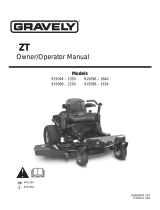 Gravely ZT 915096 – 2250 Owner's/Operator's Manual
Gravely ZT 915096 – 2250 Owner's/Operator's Manual
-
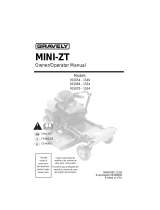 Gravely MINI-ZT 915064 Owner's/Operator's Manual
Gravely MINI-ZT 915064 Owner's/Operator's Manual
-
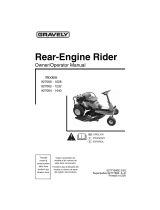 Gravely 927060-1028 User manual
Gravely 927060-1028 User manual
-
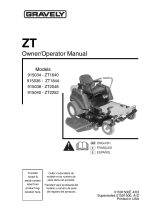 Gravely 915034 - ZT1640 Owner's/Operator's Manual
Gravely 915034 - ZT1640 Owner's/Operator's Manual
-
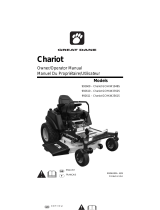 Great Dane 03896100A 992609-992610-992611 Owner's manual
Great Dane 03896100A 992609-992610-992611 Owner's manual
-
Gravely Promaster 320 Owner's/Operator's Manual
-
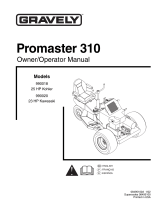 Gravely Promaster 310 User manual
Gravely Promaster 310 User manual
-
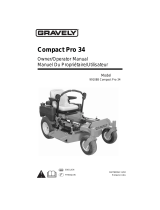 Gravely 99108 Compact Pro 34 User manual
Gravely 99108 Compact Pro 34 User manual
-
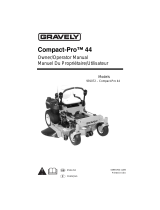 Gravely Compact-Pro 44 Specification
Gravely Compact-Pro 44 Specification
-
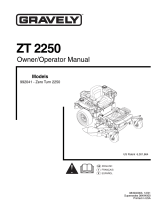 Gravely ZT 2250 Owner's And Operator's Manual
Gravely ZT 2250 Owner's And Operator's Manual












































